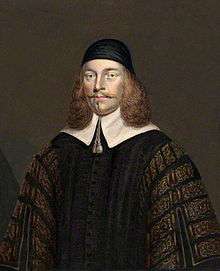Thomas Widdrington
Sir Thomas Widdrington SL (died 13 May 1664) was an English judge and politician who sat in the House of Commons at various times between 1640 and 1664. He was speaker of the House of Commons in 1656.

Life
Widdrington was the son of Lewis Mauntlaine, alias Widdrington of Cheeseburn Grange, near Stamfordham, Northumberland. He was a student at Christ's College, Cambridge in 1617 and was awarded BA in 1621. He entered Gray's Inn in 1619 and was called to the bar in 1625. He succeeded to the estated of his father in 1630. He was Recorder of Berwick from 1631 to 1658 and Recorder of York from 1638 to 1658. He was knighted at York on 1 April 1639.[1]
In April 1640 Widdrington was elected Member of Parliament for Berwick[2] in the Short Parliament. He was re-elected MP for Berwick for the Long Parliament in November 1640. As a barrister, his legal knowledge was useful during the English Civil War. In 1651 he was chosen a member of the Council of State, although he had declined to have any share in the trial of the king.[2] He was elected MP for York in 1654 for the First Protectorate Parliament. In 1656 he was elected MP for Northumberland in the Second Protectorate Parliament and was chosen as Speaker in September 1656, and in June 1658, he was appointed Lord Chief Baron of the Exchequer. In 1659 and again in 1660, he was a member of the Council of State, and on three occasions he was one of the Commissioners of the Great Seal. He lost some of his offices when Charles II was restored.[2] In 1660, he was elected MP for York in the Convention Parliament. He was elected MP for Berwick again in 1661 for the Cavalier Parliament.[1]
Widdrington founded a school at Stamfordham, Northumberland, He wrote Analecta Eboracensia; some Remaynes of the city of York which was not published until 1877, when it was edited with introduction and notes by the Rev. Caesar Caine.[2]
Widdrington died in 1664.[1]
Family
.jpg)
Widdrington married Frances Fairfax, a daughter of Ferdinando Fairfax, 2nd Lord Fairfax of Cameron and had five daughters, including Ursula, who married Thomas Hickman-Windsor, 1st Earl of Plymouth, and a son. However his son Thomas died in 1660 when MP for Morpeth. The estate at Cheeseburn Grange passed briefly to Widdrington's brother Henry and then to their brother Ralph.[1]
Notes
- History of Parliament Widdrington, Sir Thomas (c. 1600–64) of Cheeseburn Grange, Stamfordham, Northumberland
-

| Parliament of England | ||
|---|---|---|
| Preceded by No Parliament |
Member of Parliament for Berwick 1640–1653 With: Hugh Potter 1640/ Robert Scawen 1640–1653 |
Succeeded by Berwick not represented |
| Preceded by Thomas St. Nicholas |
Member of Parliament for York 1654–1656 With: Thomas Dickinson 1654–1656 |
Succeeded by Thomas Dickinson John Geldert |
| Preceded by William Fenwick Robert Fenwick Henry Ogle |
Member of Parliament for Northumberland 1656–1659 With: William Fenwick Robert Fenwick |
Succeeded by Sir William Fenwick, Bt Robert Fenwick |
| Preceded by John Rushworth George Payler |
Member of Parliament for Berwick Apr 1660 With: John Rushworth |
Succeeded by John Rushworth Edward Grey |
| Preceded by Sir William Allanson Thomas Hoyle |
Member of Parliament for York Jun 1660 – 1661 With: Sir Metcalfe Robinson, Bt |
Succeeded by Sir Metcalfe Robinson, Bt John Scott |
| Preceded by John Rushworth Edward Grey |
Member of Parliament for Berwick 1661 With: Edward Grey |
Succeeded by Edward Grey Daniel Collingwood |
| Political offices | ||
| Preceded by William Lenthall |
Speaker of the House of Commons 1656–1658 |
Succeeded by Sir Bulstrode Whitelocke |
| Legal offices | ||
| Preceded by Sir William Steele |
Lord Chief Baron of the Exchequer 1658–1660 |
Succeeded by Sir John Wilde |
.svg.png)